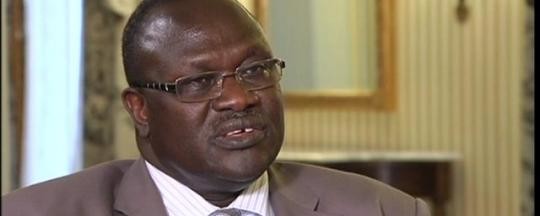South Sudan’s Vice President Riek Machar Teny will serve as co-chair of a high committee in talks with Khartoum in spite of being stripped of delegated powers last week, according to a deal signed in the Ethiopian capital yesterday.
State television in Juba had announced 15 April that the vice president was stripped of powers not duly assigned to him by the constitution
Officials had downplayed the presidential decree, saying it was an overdue administrative measure to give back to the president responsibilities he had given to his deputy before independence owing to his heavy workload as First Vice President of Sudan, a post he had held concurrently.
It was specifically noted that the Vice President was removed from chairmanship of the National Reconciliation Process and thereafter replaced by Archbishop Daniel Deng Bul.
This move was considered to have political implications. Also thrown into doubt, however, was whether Machar would also still head a high committee whose formation was announced days earlier during the visit to Juba by Sudanese President Omar al-Bashir.
The deal yesterday signals that the vice president will retain this important portfolio, albeit with heavy involvement by other key figures such as the foreign minister.
“The High Level Committee shall be co-chaired by a Vice President of each State, and it shall have four Ministers designated by each state as members including the Minister of Foreign Affairs,” stated the document signed yesterday by Minister of Cabinet Affairs Deng Alor Kuol.
Nominally, the committee shall “oversee and coordinate the implementation of the Cooperation Agreement,” as well as “direct and oversee the work of the Joint Implementation Committee,” a body headed by the foreign ministers and established as part of the same agreement.
The foreign ministers’ committee is to be given a technical staff to assist it in performing its functions, whereas the high level committee is not.
These measures are laid out in the Agreement on the Mechanisms for Implementation Monitoring, Evaluation and Dispute Resolution Relating to the Cooperation Agreement.
A memorandum attached to the agreement notes that the joint technical secretariat shall remain attached to the Lead Negotiating Panel for the duration of the mandate of the panel.
“In particular, the Joint Technical Secretariat shall continue to provide logistical and other technical support for the outstanding negotiations by the Lead Negotiating Panel,” added the memorandum, which was signed by Idriss Abdelgader and Deng Alor Kuol.
Alor yesterday stood in the position of lead negotiator hitherto carried out by SPLM Secretary-General Pag’an Amum Okiech.
The relationship between the Lead Negotiating Panel and the High Level Committee was not spelled out.
It was suggested in an article of the memorandum, however, that the panel may soon see changes in the scope of its work: “The two States may restructure the Joint Technical Secretariat to adjust its size to the scale of work of the Lead Negotiating Panel, and to enable it to provide appropriate technical support to any other implementation mechanisms, as appropriate.”




